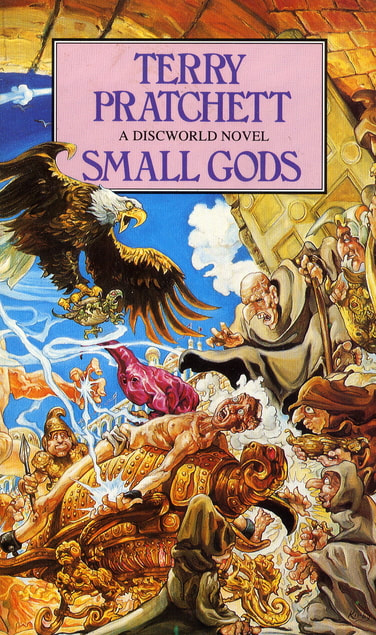Terry Pratchett’s gift for comedy was infinite, but so was his gift for wisdom (He sadly died in 2015 – I hate having to use the past tense), and both are on display in Small Gods. Brutha’s journey from novice to prophet involves real growth and development of understanding. Through it Pratchett examines how religious groups become destructive, and what being a true believer means. He himself was an atheist, and though this wasn’t the only occasion when he wrote critically about religion, he understood the basic human need for faith (see Hogfather, for instance), and this means he’s able to put forward a more well-rounded view than someone like e.g. Richard Dawkins.
As usual, he balances his serious points with comedy, poking fun at philosophy, abstinence, authority figures, flat-Earthers, and Chosen One narratives, among other topics. Some of the best lines come from the interactions between Brutha and Om, parodying the trope of a god talking to a mortal, except in this case as a turtle. The one character who’s not funny at all is Vorbis, who Pratchett manages to make genuinely chilling. The relationship between him and Brutha, which starts out as malicious ‘friendship’ and turns into deadly rivalry, is key to the book’s success.
The Discworld novels are by-and-large standalone, so if you’ve not read any before then Small Gods is a good place to start. It’s certainly one of Pratchett’s best, affirming his awesome talent as a writer, and his incisive yet compassionate worldview. Whether you’re a believer or a sceptic of religious faith, you’ll find plenty to think about and be challenged by. And, either way, a lot to laugh at.
Review by Charlie Alcock

 RSS Feed
RSS Feed
